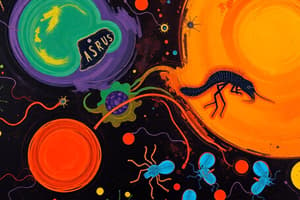Podcast
Questions and Answers
What is the initial phase of the life cycle of Plasmodium known as?
What is the initial phase of the life cycle of Plasmodium known as?
- Sporozoite stage
- Pre-erythrocytic stage (correct)
- Hepatic stage
- Erythrocytic stage
What happens to sporozoites during the pre-erythrocytic stage?
What happens to sporozoites during the pre-erythrocytic stage?
- They disappear from circulation. (correct)
- They transform into merozoites.
- They multiply rapidly in the bloodstream.
- They enter red blood cells directly.
Which cells do sporozoites invade during the pre-erythrocytic stage?
Which cells do sporozoites invade during the pre-erythrocytic stage?
- Hepatic cells (correct)
- Erythrocytes
- Platelets
- Leukocytes
In which stage does the hepatic cycle occur for Plasmodium?
In which stage does the hepatic cycle occur for Plasmodium?
What is the significance of the sporozoites in the life cycle of Plasmodium?
What is the significance of the sporozoites in the life cycle of Plasmodium?
What is a primary therapeutic use of chloroquine?
What is a primary therapeutic use of chloroquine?
Which of the following species of Plasmodium is chloroquine effective against?
Which of the following species of Plasmodium is chloroquine effective against?
Which statement best describes the curative effect of chloroquine?
Which statement best describes the curative effect of chloroquine?
What limitation does chloroquine have in malaria treatment?
What limitation does chloroquine have in malaria treatment?
What stage does the malaria parasite have in the liver with ovale malaria?
What stage does the malaria parasite have in the liver with ovale malaria?
Why might chloroquine not be considered a radical cure for malaria?
Why might chloroquine not be considered a radical cure for malaria?
Which of the following best describes how primaquine should be administered?
Which of the following best describes how primaquine should be administered?
What is a significant reason for not administering primaquine parenterally?
What is a significant reason for not administering primaquine parenterally?
Which of the following correctly identifies a characteristic of primaquine's pharmacokinetics?
Which of the following correctly identifies a characteristic of primaquine's pharmacokinetics?
What is the primary reason for the use of primaquine in malaria treatment?
What is the primary reason for the use of primaquine in malaria treatment?
What is one of the reported effects associated with resistance in some countries?
What is one of the reported effects associated with resistance in some countries?
Which symptom has NOT been reported in relation to resistance?
Which symptom has NOT been reported in relation to resistance?
Alongside transient heart block, what other clinical effect has been reported?
Alongside transient heart block, what other clinical effect has been reported?
In the context of the content, which phenomenon is identified as developing in some countries?
In the context of the content, which phenomenon is identified as developing in some countries?
What is a common clinical response observed alongside resistance phenomena?
What is a common clinical response observed alongside resistance phenomena?
What is the primary mechanism through which certain anti-parasitic drugs operate?
What is the primary mechanism through which certain anti-parasitic drugs operate?
Which type of hypnozoites are not affected by the discussed anti-parasitic drugs?
Which type of hypnozoites are not affected by the discussed anti-parasitic drugs?
Which form of artemesinin can be administered intramuscularly?
Which form of artemesinin can be administered intramuscularly?
In what way can artemesinin be administered?
In what way can artemesinin be administered?
Which statement about the pharmacokinetics of artemesinin and artesunate is correct?
Which statement about the pharmacokinetics of artemesinin and artesunate is correct?
Study Notes
Life Cycle of Plasmodium
- Sporozoites invade hepatic cells during the pre-erythrocytic stage, disappearing rapidly from circulation.
- This stage is also referred to as the hepatic cycle.
Chloroquine
- Utilized to manage acute and recurrent malaria attacks but does not provide radical cure.
- Effective against all species of Plasmodium: P. falciparum, P. vivax, P. malariae, and P. ovale.
- Particularly important for treating P. ovale malaria, which has a dormant liver stage.
Primaquine
- Administered orally and exhibits good absorption.
- Not suitable for parenteral use due to risk of severe hypotension.
- Acts by inhibiting parasite calcium-dependent ATPase.
- Ineffective against liver hypnozoites, which are dormant forms of the parasite.
Artemesinin and Related Compounds
- Administered orally or via intramuscular injection; artesunate is also available in oral form.
- Resistance to these drugs is emerging in certain regions.
- Adverse drug reactions (ADR) include transient heart block, reduced blood neutrophil count, and temporary fever episodes.
Studying That Suits You
Use AI to generate personalized quizzes and flashcards to suit your learning preferences.
Related Documents
Description
This quiz explores the pre-erythrocytic stage of the Plasmodium life cycle. It focuses on the invasion of sporozoites into hepatic cells and the significance of this phase in the malaria infection process. Test your knowledge of this crucial stage in the life cycle of the malaria parasite.




